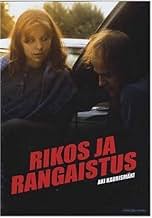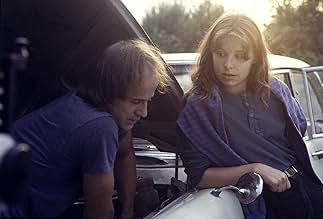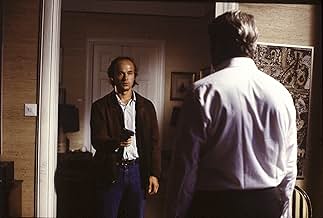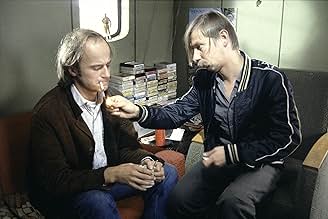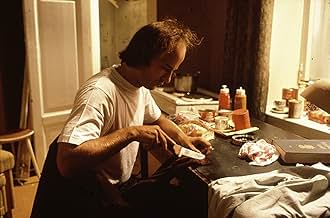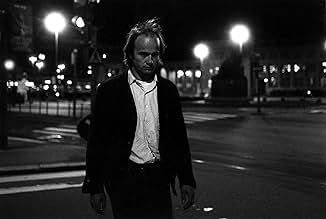Adaptación de la novela de Dostoievski, ambientada en la Helsinki actual. Rahikainen, trabajador de un matadero, asesina a un hombre y se ve obligado a vivir con las consecuencias de sus act... Leer todoAdaptación de la novela de Dostoievski, ambientada en la Helsinki actual. Rahikainen, trabajador de un matadero, asesina a un hombre y se ve obligado a vivir con las consecuencias de sus actos.Adaptación de la novela de Dostoievski, ambientada en la Helsinki actual. Rahikainen, trabajador de un matadero, asesina a un hombre y se ve obligado a vivir con las consecuencias de sus actos.
- Dirección
- Guionistas
- Elenco
- Premios
- 2 premios ganados y 1 nominación en total
- Pianist
- (as Pedro's Heavy Gentleman)
- Drummer
- (as Pedro's Heavy Gentleman)
- Opera Singer
- (sin créditos)
- Man at the Police Station
- (sin créditos)
- Opera Singer
- (sin créditos)
- Dirección
- Guionistas
- Todo el elenco y el equipo
- Producción, taquilla y más en IMDbPro
Opiniones destacadas
At the beginning, we're guided through a slaughterhouse. This is where the protagonist, Antti Rahikainen (Markku Toikka), works. This particular environment suits the film, as it prepares us for its subsequent tone. Rahikainen takes the rest of the day off and breaks into an apartment. Once there, he kills an old man. Unfortunately, there's a witness: Eeva Laakso (Aino Seppo), who however refuses to turn in the murderer, thinking he will himself confess the crime eventually.
Of course, that doesn't happen. Police inspector Pennanen (Esko Nikkari) is dead certain of Rahikainen's role in the story, given there's a motive and all (the victim accidentally killed Rahikainen's fiancée by running her over with a car). But with no evidence and no collaboration from Eeva, there are few chances the killer will be arrested.
Kaurismäki has done a remarkable job on his first film, mostly because he nails the mood: he shows us the murkiest sides of Helsinki, and almost everyone depicted in the movie is cold and unemotional, a factor which adds to the unsettling nature of the story. There's little room for humor, with only a few exceptions: Rahikainen's best friend Nikander (Matti Pellonpää), struggling with English lessons, and the straight, serious delivery of some dialogue, most notably the first conversation between Rahikainen and Eeva ("What's wrong with him?" "Nothing. He's dead." "How did he die?" "I killed him.").
An excellent human drama, and also the beginning of a brilliant career. Those interested in Finnish cinema should give this a look.
The plot had even some surprising twists, and the ending is done so, that it made me wonder that maybe Kaurismäki has some personal experiences of such feels of guilt and isolation as the main male character. This film, even if it's done nearly 20 years ago, is more than fit to make us think about our current world, and the direction we are heading.
People seldom smile in Kaurismaki's Helsinki, and have pensive, reflective ways and a deliberateness about them, whether they are police inspectors or pastry shop employees. Rather than the process that brought Antti Rahikainen (Kaurismaki's Raskolnikov) and his conscience to turn himself in to the police, I was struck by the way the movie plays with the spectator's sympathies. Rahikainen inspires sympathy one moment and lack of it the next; then, once again, you develop sympathy followed by antipathy and a desire to see him punished. At least I found it to be the case, and it wasn't that I mentally chastised him for the murder, either. As Rahikainen himself twice said during the course of the movie, you don't really feel like he's killed a man, so much as a principle. The film doesn't go to great lengths to explain what principle that might be, but you can somehow intuit it, and even approve of his actions to some degree - at least in a very abstract sense. And it's not even like the murdered man is ever presented as being repulsive! If there was ever a crime movie more cerebral than this, I would really like to hear about it! One quality I admire in Kaurismaki that's perfectly illustrated by this movie is his use of interior spaces. The way he films rooms with people in them, though it's done in an absolutely subtle, functional and non-showy way, really gives a sense of their context within the world they inhabit and the thoughts and feelings that float around them in said rooms and interiors. The very last frame of the guard shutting the prison door behind Rahikainen after he's been speaking to Eeva (roughly the equivalent of Sonya from Dostoyevsky's novel), really gives a sense that the spaces you inhabit are mostly a reflection of your state of mind, your interior state. After having seen the young murderer in his grotty rented room before, emprisoned within his own musings and guilt, the literal prison he occupies after he turns himself in seems no more restictive of his freedom than his previous mental state. In this sense, Kaurismaki's Crime and Punishment is very similar to the spirit of Dostoyevsky's novel.
The novel is a classic of universal literature, which inspired philosophical, sociological and psychological thoughts in the second half of the 19th century and also in the 20th century, namely Nietzsche, Sartre, Freud, Orwell, Huxley, among others. It's no surprise that it had more than thirty film adaptations, between 1909 and 2019.
This 1983 Finnish adaptation is practically Aki Kaurismäki's directorial debut (before this film he had only directed a musical documentary, in 1981, together with his brother Mika Kaurismäki, who here takes on the role of producer).
It is a promising film, although it neither captures the depth of the novel (none of the adaptations do, obviously) nor shows, still fully developed, the Kaurismäki style, of which it already gives good indications, but only appears mature in the following film, Calamari Union. However, both have in common a taste for minimalist absurdity, which would become the Finnish director's trademark.
An interesting work, mainly because it is the debut of an important director, but it ends up being too conventional, within the Finnish master's work as a whole.
Still, it certainly deserves to be seen.
¿Sabías que…?
- TriviaAki Kaurismäki's narrative directorial debut. He chose this project after reading François Truffaut's interview with Alfred Hitchcock, where Hitchcock claimed Crime and Punishment was the one book he would never adapt, because "it would be too difficult." Kaurismäki later admitted it was too difficult.
- Citas
Antti Rahikainen: [to Eeva Laakso] I'll tell you something. The man I killed is not important. I killed a louse, and became one myself. The number of lice remained constant. Unless I was one from the very beginning - but that's not important. I wanted to kill a principle, not a man.
- ConexionesFeatured in Selección TCM: Aki Kaurismaki (2012)
- Bandas sonorasCadillac
Written by Kim Brown, Denys Gibson, Ian Mallet, Stuart Graham Johnson and Vince Taylor
Performed by The Renegades
Selecciones populares
- How long is Crime and Punishment?Con tecnología de Alexa
Detalles
Taquilla
- Presupuesto
- FIM 1,726,378 (estimado)
Contribuir a esta página


